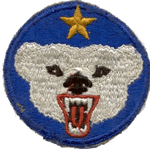World War II in the Aleutians - Shemya (APO 729)
January 26, 1943 to January 27, 1946
1. Recap of Army Facilities
Ft. Benjamine Harrison, Indiana
Ft. McClellan - Anniston, Alabama
Ft. Lawton - Seattle, Washington
4. Shemya
7. My Outfit
8. My Buddies
12. Potpourri
14. Coincidences
When the war was over, a new word became part of the vocabulary - - -
"Rotation". A simple point system, primarily based on months of
service, stateside and overseas, would determine when you might be
headed home.
We left years before as boys and were going to return as men.
Some saw action - some saw death - some were lucky - some not -
but, none of us came back exactly as we left.
As the time was nearing, the tenor of conversations changed.
The appearance of being outwardly happy to return home had a subtle
undercurrent - - - a bit of worry- - - some silent thoughts may have been;
I can't return to my parents to live - - - in the nursery room I grew up in?
- - - no way!
The job I left paid little, was marginal, - - - or no longer exists - - - what
do I want to do?
How long will the $1,400 I saved in the Army last?
I understand, with 10 million servicemen returning, there's a housing
shortage. My wife and children have been staying with her mother.
Where shall we live now? Certainly not there!
Should I go back to school? With those young kids? What should I
study? Where will I get the money? (The G.I. bill didn't kick in yet).
Someone wrote to me saying that my girl was seriously dating another
guy. No wonder I haven't
received answers to my letters recently.
When I fill out applications for a job, they will ask how far I went in school,
and what kind of work experience I had. How do I respond?
These are just a few things, I'm sure, that went through the minds of many.
This may account for those who re-enlisted. ie., the need for the familiar,
to know where you're going to sleep, where you'll get your meals, your
clothes, what you'll be doing tomorrow.
During the war, women felt the courage and need to do "men's" work and
the exhilaration of being financially independent. Rightfully, they weren't
going to give that up. Jobs would not be plentiful for returning servicemen
until the economy switched back to consumer needs.
For minorities, "now that they wore the
'White Man's War' ", do they go back to second-class status?.
Many similar problems came some time after the home-coming parties,
the ones with banners, baloons, and lots of "rationed" good food.
The American Legion and the V.F.W. offered a good place for those
who wanted to talk about those same times that they were miserable
with at those same times!
